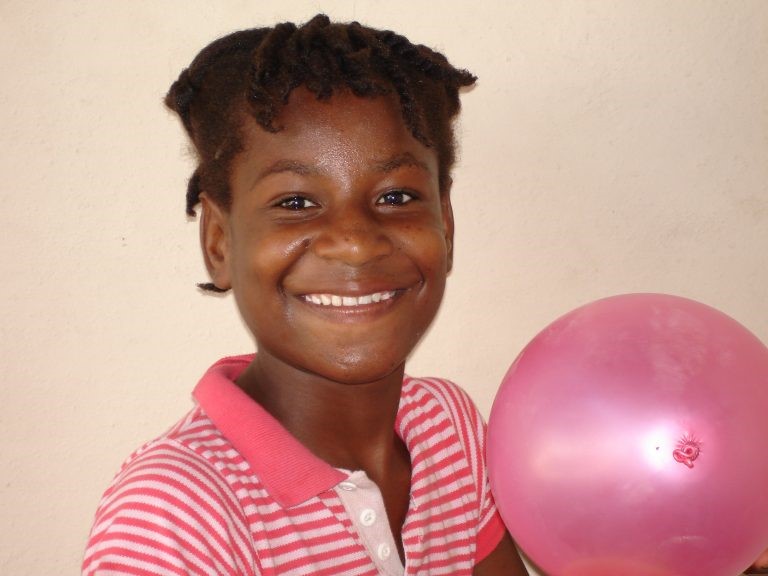
Edited by Karen F. Dimanche Davis.
I recently sat down in Jacmel with Jacques Africot, the Director of Orphans International Haiti, to speak about the role of education in the developing world. OI Haiti is part of Orphans International Worldwide, which I founded a decade ago.
“All families – anywhere in the developing world, maybe simply anywhere in the world – wish to have well-educated children, even though they themselves might lack a formal education,” Jacques said.

Jacques is the man of the house, serving as male role model for our orphan children.
Over the course of an interview, Jacques told me the following:
“Here in Haiti, parents think that once they tell the children not to do something, the children must obey. But often the children disobey – because the parents themselves are not doing what they are asking.”
Jacques continued:
“It is a typical example of ‘do what I say, not what I do.’ In reality, children do what they watch their parents do, not what the parents advise them to do At Orphans International Haiti, we serve as the parents to the children in our care. We must be able to raise these kids to become productive members of our society – to move themselves and our nation forward.”

Jacques (r.) relaxes with a supporter from America, Tommie Pegues (l.).
“I have observed that they imitate us. I like to read and the children notice that. They, in turn, pick up a book themselves. They begin to read.
I file reports to New York regularly on the computer. As I work electronically, our kids ask me if they, too, can go on-line – to meet the world, to learn new things, to practice reading and writing. They also, of course, like kids in the U.S., want to play electronic games.
“I think the best method to educate these kids – any kids – is to have the parent or houseparents do what they want children to do. The kids will do it without being told anything else.

Jacques Africot at the Cyvadier Plage Hotel, down the road from OI Haiti.
“In general, we don’t leave the TV on in our orphanage home. We make television special – and we gather to watch special programs or a movie – and discuss them afterwards.
“One French movie we watched together recently was Kirikou, about an island village without water. One special little boy in the film was able to bring water to the village. He was magic.
“Our children repeat phrases from the movie endlessly. “Kirikou might be small, but he is bright!” is often heard in our home.
“I know that if I had shown them an inappropriate movie, they would do the same. It is up to me as director to feed their young minds carefully.
Sharing a cup of coffee with Jacques Africot as I interview him for this piece.
“I also like to encourage our kids to do things themselves. Let them try it on their own. Of course, they often fail the first time, but they do not get discouraged and try again.
“Running this project, we are often low on funds – especially given the economy. But I do not give up – I figure out how to make things happen. The children watch my every move. They learn and grow.

Jacques depends on staff like houseparent Faline to set examples for the kids.
“Everyone has their own dream, but I would hope that our children grow up to serve their community. Serving the community while building their own families is the most important thing I think they can do.
“It is my hope that our children will be engineers, teachers, nurses. But if they want to be a beautician or work in construction, it does not matter. What matters is that they know they have an obligation to our society. And they worked to fulfill this obligation.
“I remember Rose Nancy, one of our girls, once asked me what she and her ‘siblings’ needed to give me – what they owed me – for raising them. I told her, “Only be successful in whatever you do!”
“I was trained in Indonesia, working with Tsunami orphans beginning 2005. I saw there was a challenge with how to get the boys to treat the girls fairly.
“Of course, this was a different culture than my own. It was Asian and Moslem – but the commonalities were great.
“The problem was, the girls complained that the boys were teasing them. Does this ever happen in America? I realized we sometimes do not get the reason kids react the way that they do. Why they do something mean-spirited.
“I remember we explained to one teenage boy how to treat the girls. He asked, “So I am not allowed to be friends with – to play with – the girls?” In his mind, his teasing was just playing.
“I explained that sometimes boys’ ways may not match with the girls’ way. I said, when he plays with girls, he needs to play by their rules. To be gentle.
“It reminds me of the dog and cat playing with each other in our home. Sometimes the dog plays too rough. It is his nature. But we are there to intervene when needed.

Jacques Africot (heart T-shirt) with staff and volunteers from around the world.
It amazes me as I travel the world to visit Orphans International projects – in Indonesia, in Sri Lanka – how staff like Jacques bring their wisdom to the children but also how much they learn from them. They give so much, but however hackneyed, they get so much back in return. I know I do.
Haitian NGO Leader On Orphan Care Originally posted in Daily Kos, November 8, 2009.